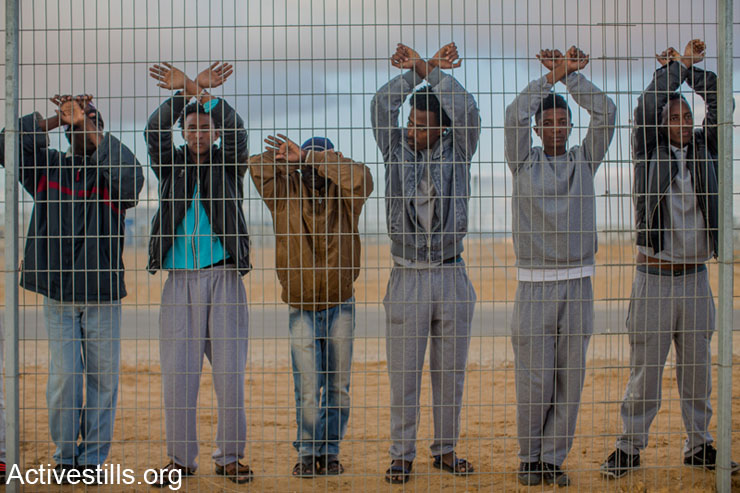Asylum seekers imprisoned in Holot celebrate the ruling but warn that it’s not clear what will happen next.

Israel’s High Court of Justice on Monday struck down key parts of a law that allows the indefinite detention of African asylum seekers in Israel’s ‘Holot’ detention facility, also striking down a section that permits the automatic year-long detention of newcomers. The court ordered the state to shutter Holot within 90 days.
Almost exactly a year ago, the court struck down a previous version of the law that authorized the detention of asylum seekers, prompting lawmakers to quickly draft a replacement — one that led to the creation of the Holot facility and permitted indefinite detention.
Read a response from a refugee detained in Holot
In the ruling, Justice Fogelman explains that imprisonment inherently infringes on the right to human dignity and that,
Every person, by virtue of being a person, has a right to human dignity … and infiltrators are people. And if that needs explanation, let’s say it explicitly: infiltrators do not lose one ounce of their right to human dignity just because they reached the country in this way or another.
One asylum seeker imprisoned in Holot whom +972 spoke to sounded overjoyed but warned about celebrating too early.
Read +972′s full coverage of the refugee issue
“We can celebrate but not too much because we don’t know what will happen next,” he said, adding, “we need to make sure that the Interior Ministry doesn’t create a new mechanism for imprisoning us.”
A consortium of civil and refugee rights organizations who were the petitioners that challenged the law, wrote in response to the ruling:
The court made it clear today, once more, in a categorical and unequivocal manner, that the policy toward asylum-seekers cannot be solely based on mass detention of innocent people or complete disregard of the issue.
Both the refugee and the Hotline made conciliatory statements toward the residents of south Tel Aviv, who have been the most vocal opponents to granting any rights to African asylum seekers and who have held sometimes-violent demonstrations against them.
The majority of Israel’s refugee population lives in south Tel Aviv and the neighborhood’s already inadequate infrastructure has been severely stressed by the influx of newcomers.
“We need to wait and see what the reaction is in south Tel Aviv,” one Sudanese asylum seeker in Holot added. “We know that there are many people who are very angry and the asylum seekers need to be sensitive and understanding about the residents of south Tel Aviv.”
He also called on Israelis and the international community to join them in putting pressure on Israel to grant the asylum seekers their rights.
Read also: The origins and politics of Israel’s refugee debate
Refugees, both those who are already in Holot and those in danger of being sent there, have launched a number of high-profile public protests this year — protests that raised the profile of their plight in Israel and internationally.
The petition against the law was filed by the Hotline for Refugees and Migrants, the Association of Civil Rights in Israel, Assaf – Aid Organization for Refugees and Asylum Seekers in Israel, Kav LaOved, Physicians for Human Rights-Israel and Amnesty International-Israel.
The court decision did not prescribe how the state should deal with the tens of thousands of asylum seekers that Israel systematically refuses to recognize as refugees but also admits it cannot deport. Without legal status, asylum seekers have no social or health rights and cannot legally work.
Stay tuned to +972 for news and analysis on the High Court’s ruling later in the coming days and hours.
Yael Marom contributed to this report.
Related:
Marching toward freedom in a fictional plot of land
Israel hasn’t recognized one Sudanese refugee

